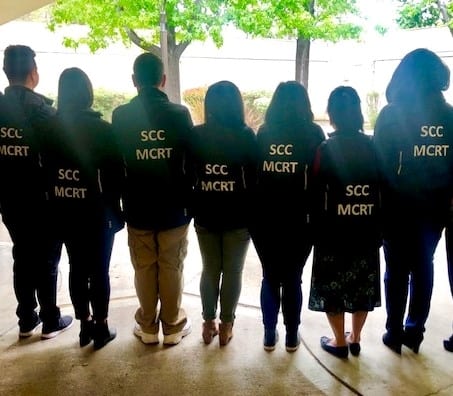Since the start of the pandemic and orders to stay inside, Santa Clara County has seen a rise in calls to a suicide prevention hotline — a trend that is mirrored nationally.
The national Disaster Distress Helpline is receiving a notable uptick in calls during the COVID-19 pandemic with a more than 900% increase in calls last month compared to May 2019. Santa Clara County is seeing an increase in crisis calls too, with 215 calls received in May 2020 compared to 157 in February, before the shelter-in-place orders were enacted.
“I would say we’re busier than normal,” said Mikelle Le, a senior program manager for the county’s Mobile Crisis Response Team. “We had the highest number of services provided in May.”
Le’s team provided crisis support to 98 callers in May compared with 47 in February. The number of individuals transported to the hospital for a mental health crisis doubled to 26 in May compared to 13 in February.
A relatively new component of the county’s Behavioral Health Services Department, the Mobile Crisis Response Teams are staffed with 11 licensed clinicians and therapists, with another eight on call. They screen crisis situations over the phone to determine whether a mental health professional should respond to help de-escalate a crisis.
Le helped found the Mobile Crisis Response Team in January 2018. The initial program operated with a smaller staff that worked exclusively from referrals provided by local law enforcement.
In April 2019, the county launched the community line and began accepting calls from individuals concerned about the mental health of others, whether they are loved ones or strangers encountered in a public place.
Team members go to wherever a mental health crisis is occurring, Le said, and assist with de-escalating the situation and connecting people with resources to help them.
A countywide crisis text line was launched in June 2019 and is staffed with mental health professionals provided by a national firm, said county spokeswoman Joy Alexiou.
The text line has also seen a significant increase amid the coronavirus pandemic with a jump from 20 to 40 text conversations per month to 171 in March. In April and May, those numbers decreased to 76 and 68 conversations, respectively, but they still remained higher than the average.
The Gilroy Garlic Festival shooting in August 2019 was the only comparable month to March, Alexiou noted.
While calls to the county’s helpline have seen an uptick, suicide rates in the county have actually experienced a decline. According to county officials, 27 suicides were reported in the county from a period of March 16 to June 8 this year compared to 38 in that same period in 2019.
The 2020 numbers are subject to change, however, as the county’s medical examiner closes cases, officials note.
The Disaster Distress Helpline is a sub-network of the National Suicide Prevention Lifeline. The latter program has not experienced any significant changes at this time, according to Hannah Collins, a spokeswoman for both lines.
“For both lines, we cannot be certain of the number of Disaster Distress Helpline calls and texts that are specifically related to the COVID-19 outbreak,” Collins said in an email to San José Spotlight. “But helpline counselors have reported callers expressing feelings of isolation and interpersonal concerns related to social distancing, as well as financial concerns.”
Similarly, Le says she can’t attribute the increase to the county’s mental health services solely to the pandemic. Stress related to George Floyd’s death, police violence and calls to defund police might also play a part in a continued increase in calls, she noted.
Still, the pandemic is a notable factor, she said, especially because the county’s shelter-in-place orders are likely closing off activities that helped support an individual’s mental health.
“You can’t go out to do outdoor activities or go to a friend’s house,” Le said. “I’m pretty sure there’s a correlation.”
The Mobile Crisis Response Team is available 24 hours a day, seven days a week. Team members can be reached at 1-800-704-0900. Press option 2 for mobile crisis.
The Disaster Distress Helpline can be reached at 1-800-985-5990.
The National Suicide Prevention Helpline can be reached at 1-800-273-8255.
The Crisis Text Line can be reached by texting RENEW to 741 741.
Contact Carina Woudenberg at [email protected] or follow @carinaew on Twitter.
This story has been updated to include the county’s suicide data.



Leave a Reply
You must be logged in to post a comment.